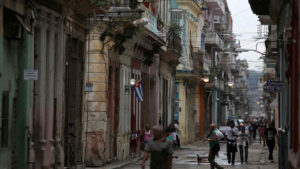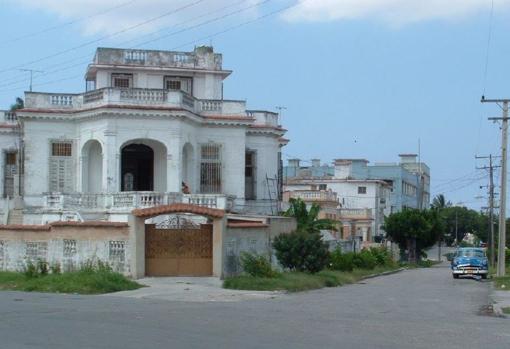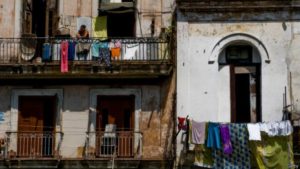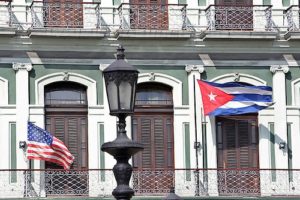 MILES DE HEREDEROS CUBANOS Y ESPAÑOLES ESPERAN LA DEVOLUCIÓN DE SUS PROPIEDADES EXPROPIADAS EN CUBA.
MILES DE HEREDEROS CUBANOS Y ESPAÑOLES ESPERAN LA DEVOLUCIÓN DE SUS PROPIEDADES EXPROPIADAS EN CUBA.
Con apenas 14 años, el español pontevedrés Raúl Lesteiro desembarcó a principios del siglo XX en Cuba, una tierra entonces llena de oportunidades. Allí prosperó, se hizo con unos terrenos junto a la playa en La Habana y llegó a dirigir la destilería El Infierno, en Sagua la Grande, una de las grandes productoras de ron de la isla. Antes de que triunfara la revolución, se marchó a Estados Unidos, pero no pudo evitar que a partir del 1 de enero de 1959, cuando Fidel Castro llegó al poder, su patrimonio fuera expropiado por el nuevo régimen. Como él, miles de cubanos, españoles y ciudadanos de otras nacionalidades perdieron de un plumazo el fruto de una vida de esfuerzo.
El pasado 2 de mayo la Administración de Donald Trumplevantó la suspensión de una parte de la llamada ley Helms-Burton que permite a los estadounidenses llevar a los tribunales a empresas que se beneficien de bienes confiscados por el castrismo, algo que puede afectar a grandes grupos hoteleros españoles. Tanto el Gobierno de Pedro Sánchez como la Unión Europea han salido en su defensa, pero ni uno ni otra se acuerdan ya de los expoliados.
NEGOCIACIONES DE ESPAÑA Y CUBA.
En el caso de los españoles, el asunto se trató de zanjar con un convenio bilateral que empezó a negociarse bajo el gobierno de Adolfo Suárez y que se firmó en La Habana el 16 de noviembre de 1986, ya con Felipe González al frente del Ejecutivo. En el acuerdo, Cuba se comprometía a pagar a España 5.416 millones de pesetas (unos 32,5 millones de euros) «como liquidación y finiquito de la indemnización por todos los bienes, derechos, acciones e intereses de las personas naturales y jurídicas de nacionalidad española que han resultado afectadas por leyes, disposiciones y medidas dictadas por el Gobierno de la República de Cuba desde el 1 de enero de 1959 hasta la fecha de la firma del presente convenio, ambas inclusive». De esa cantidad, un tercio se abonaría en metálico y el resto en especie, a base de productos como tabaco, azúcar o camarones. Más de 3.000 españoles serían indemnizados.
Sin embargo, muchos estimaron que las cantidades fijadas se quedaban lejos de su valor real, en torno a la quinta parte de lo que les correspondía. Otros se quedaron sin nada porque ni siquiera se enteraron de que se estaba elaborando una lista.
El Tribunal Supremo confirmó en 2003 y 2004 la validez del convenio, pero también indicó que no extingue el ejercicio del «hipotético derecho de los particulares a recuperar la propiedad confiscada o a conseguir una justa indemnización, planteando, a tal efecto, la correspondiente reclamación ante el actual o ante un posterior Gobierno cubano».
Los magistrados aclaran que hablan de «hipotéticos derechos» porque «mientras el actual régimen político cubano subsista es de todo punto inimaginable que una pretensión resarcitoria de los afectados pueda prosperar, siendo por ello algo fuera de la realidad, contrario a la naturaleza de las cosas, pensar que se pueda obtener un resultado mejor al conseguido después de tantos años de negociaciones, máxime si tenemos en cuenta la situación económica actual de la República de Cuba, sin visos de recuperación a corto plazo».
LA ESPAÑOLA “1898 COMPAÑIA DE RECUPERACIONES PATRIMONIALES”.
Sin embargo, más de tres décadas después de aquel convenio hispano-cubano, cientos de familias españolas siguen anhelando recuperar lo que la dictadura castrista les arrebató. Una empresa privada, ‘1898 Compañía de Recuperaciones Patrimoniales’, lleva años agrupando a víctimas españolas del expolio cubano y tratando de darles esperanzas. En lugar de acudir a la vía judicial, su estrategia es recopilar por ahora la documentación que acredite la propiedad o la herencia de los bienes y hacer las gestiones oportunas para que, llegado el momento, Cuba las devuelva. El director general de la compañía, Jordi Carabarrocas, explica, tras estudiar 40 casos similares en otros países, que en un 90% se acababa devolviendo lo incautado a sus legítimos dueños. «En un momento cercano de la historia, Cuba entrará en ese camino de la reversión» de las expropiaciones, apunta convencido.
Hasta ahora, ‘1898 CRP’ ha reunido a 450 familias españolas, de ellas medio centenar residentes en EE.UU., aunque cree que podría haber 3.000 en total, con bienes confiscados por valor de 30.000 millones de dólares. Según Cabarrocas, aunque los españoles no puedan acogerse a la ley Helms-Burton, la última medida de Trump las beneficia indirectamente, porque EE.UU. «tira del carro» y «a corto o medio plazo va a paralizar cualquier inversión en Cuba», lo que forzaría la reversión. De hecho, Cabarrocas se embarcó en esta iniciativa como una oportunidad de negocio. Asegura que la empresa ha invertido millones de euros en gestiones que confía en recuperar, ya que percibiría un 30% de los bienes que recobre cada familia.
Entre quienes han acudido a ‘1898 CRP’ hay posibles herederos de Raúl Lesteiro. «España negoció muy mal», lamenta Elena Cáceres Senn, su nieta política. A su juicio, el Gobierno fue «más protector de las relaciones diplomáticas que de los ciudadanos», critica en su domicilio del barrio de Prosperidad de Madrid. Mientras, muestra a ABC un documento del Registro de La Habana que reconoce a su pariente como propietario de 17.549 m2 en la playa de Santa María del Mar, hoy ocupados por el Hotel Gran Caribe Club Atlántico. Según señala, los inmuebles confiscados incluyen un gran caserón en la capital cubana.
Raúl Lesteiro, que murió en 1963 en Madrid, no entró en el listado del convenio porque en el momento de la expropiación había adquirido la nacionalidad cubana y, además, había desaparecido la documentación, que ahora se está rastreando. En todo caso, «más allá del dinero, es un tema de justicia y de cerrar una página de la historia familiar», sostiene Cáceres.
El Gobierno español considera que las reclamaciones sobre bienes expropiados son ya, al menos en lo que se refiere a conflicto entre Estados, un caso cerrado. Fuentes del Ministerio de Asuntos Exteriores señalan a ABC que el planteamiento norteamericano, con la «imposición de una ley más allá de las fronteras -en referencia al Título III de la ley Helms Burton- no es homologable al planteamiento europeo», basado en la negociación de un acuerdo para establecer una indemnización.
«Cuba y España cerraron un acuerdo de Estado a Estado que establecía una indemnización para los afectados en 1986 cuya reapertura está fuera de lugar», recalca Exteriores. En este sentido, señala, «cualquier reclamación que se plantee tendrá que ser, exclusivamente, a nivel particular».
At just 14 years old, the Spaniard from Pontevedra Raúl Lesteiro landed at the beginning of the 20th century in Cuba, a land full of opportunities at the time. There he prospered, he took some land by the beach in Havana and managed to run the El Infierno distillery, in Sagua la Grande, one of the island’s great rum producers. Before the revolution triumphed, he left for the United States, but could not avoid that from January 1, 1959, when Fidel Castro came to power, his patrimony was expropriated by the new regime. Like him, thousands of Cubans, Spaniards, and citizens of other nationalities lost in a stroke the fruit of a lifetime effort.
On May 2, the Administration of Donald Trump has lifted the suspension of a part of the so-called Helms-Burton law that allows Americans to bring to court companies that benefit from property confiscated by Castroism, something that can affect large groups, Spanish hoteliers. Both the Government of Pedro Sanchez and the European Union have come out in their defense, but neither one of them remembers the plundered.
NEGOTIATIONS OF SPAIN AND CUBA.
In the case of the Spaniards, the matter was tried to settle with a bilateral agreement that began to be negotiated under the government of Adolfo Suárez and that was signed in Havana on November 16, 1986, already with Felipe González at the head of the Executive. In the agreement, Cuba committed to pay Spain 5,416 million pesetas (about 32.5 million euros) “as liquidation and settlement of compensation for all assets, rights, actions and interests of natural persons and legal entities of nationality Spanish that have been affected by laws, provisions and measures issued by the Government of the Republic of Cuba since January 1, 1959 until the date of signing this agreement, both inclusive. Of that amount, a third would be paid in cash and the rest in kind, based on products such as snuff, sugar or shrimp. More than 3,000 Spaniards would be compensated.
However, many felt that the amounts fixed were far from their real value, around a fifth of what they were entitled to. Others were left with nothing because they did not even know that a list was being drawn up.
The Supreme Court confirmed in 2003 and 2004 the validity of the agreement, but also indicated that it does not extinguish the exercise of the “hypothetical right of individuals to recover the confiscated property or to obtain just compensation, proposing, for this purpose, the corresponding claim before the current or before a later Cuban Government ».
The magistrates clarify that they speak of “hypothetical rights” because “as long as the current Cuban political regime subsists, it is completely unimaginable that a claim for compensation from those affected can prosper, being therefore something out of reality, contrary to the nature of things. , to think that a better result can be obtained than after so many years of negotiations, especially if we take into account the current economic situation of the Republic of Cuba, without any signs of recovery in the short term “.
SPANISH” 1898 PATRIMONIAL RECOVERY COMPANY “.
However, more than three decades after that Spanish-Cuban agreement, hundreds of Spanish families continue to yearn to recover what the Castro dictatorship snatched from them. A private company, ‘1898 Patrimonial Recovery Company’, has for years been grouping Spanish victims of Cuban plunder and trying to give them hope. Instead of going to court, his strategy is to collect the documentation that proves the ownership or inheritance of the goods and take the necessary steps so that, when the time comes, Cuba will return them. The general director of the company, Jordi Carabarrocas, explains, after studying 40 similar cases in other countries, that in 90% he ended up returning what was seized to his legitimate owners. “At a moment in history, Cuba will enter this path of reversal” of the expropriations, he says with conviction.
So far, ‘1898 CRP’ has brought together 450 Spanish families, of which fifty residents in the US, although he believes there could be 3,000 in total, with confiscated assets worth 30,000 million dollars. According to Cabarrocas, although Spaniards can not benefit from the Helms-Burton law, Trump’s last measure benefits them indirectly, because the US «Pull the car» and «in the short or medium term it will paralyze any investment in Cuba», which would force the reversal. In fact, Cabarrocas embarked on this initiative as a business opportunity. He assures that the company has invested millions of euros in procedures that he hopes to recover since he would receive 30% of the assets that each family recovers.
Among those who have gone to ‘1898 CRP’ there are possible heirs of Raúl Lesteiro. “Spain negotiated very badly,” laments Elena Caceres Senn, her political granddaughter. In his opinion, the Government was “more protective of diplomatic relations than of citizens,” he criticizes at his home in the Prosperidad neighborhood of Madrid. Meanwhile, it shows ABC a document from the Havana Registry that recognizes its relative as the owner of 17,549 m2 on the beach of Santa María del Mar, now occupied by the Gran Caribe Club Atlántico Hotel. As he points out, the confiscated properties include a large house in the Cuban capital.
Raúl Lesteiro, who died in 1963 in Madrid, did not enter the agreement list because at the time of the expropriation he had acquired Cuban nationality and, in addition, the documentation had disappeared, which is now being traced. In any case, “beyond money, it is a matter of justice and closing a page of family history,” says Cáceres.
The Spanish Government considers that the claims on expropriated property are already, at least as regards conflict between States, a closed case. Sources from the Ministry of Foreign Affairs pointed out to ABC that the North American approach, with the “imposition of a law beyond borders -in reference to Title III of the Helms-Burton law- is not comparable to the European approach”, based on the negotiation of an agreement to establish compensation.
“Cuba and Spain closed a State-to-State agreement that established compensation for those affected in 1986 whose reopening is out of place,” Foreign Affairs stresses. In this sense, he says, “any claim that arises will have to be, exclusively, at a particular level”.
Agencies/ ABC.es/ Manuel Trillo/ Extractos/ Excerpts/ Internet Photos/ Arnoldo Varona/ www.TheCubanHistory.com
THE CUBAN HISTORY, HOLLYWOOD.












